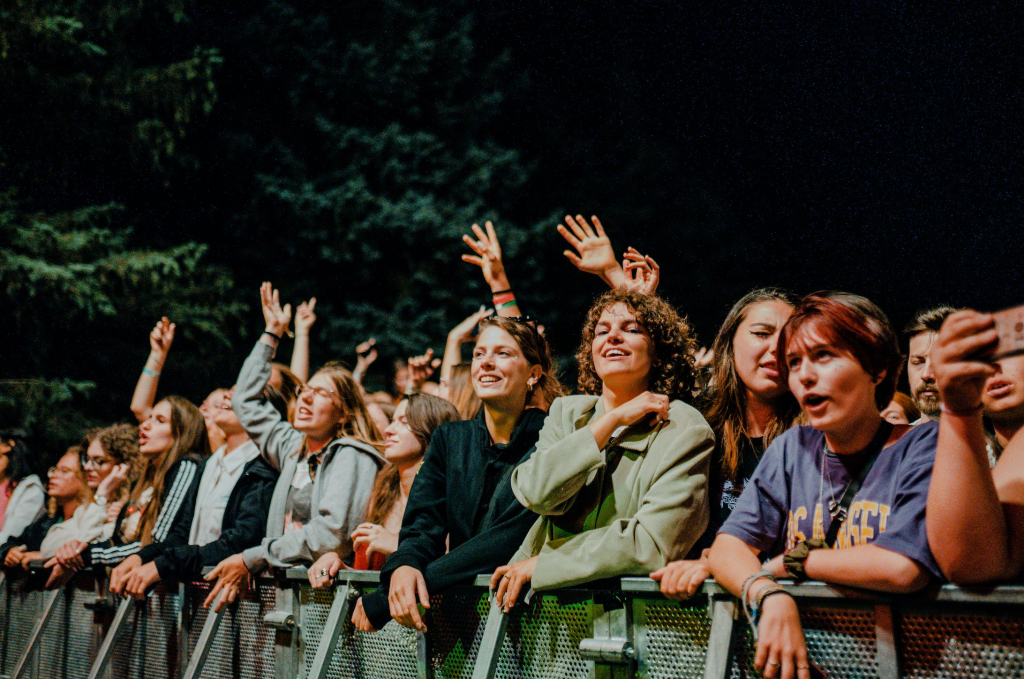Bánkitó Nonprofit Festival
We consider Bánkitó as a social enterprise.
Alright, but what does this mean?
Bánkitó is considered a social enterprise because it sets the representation of social values as its goal, and reinvests any potential profit into its social mission.
We do not see organizing the festival as a business opportunity, but rather, we use the festival as a tool for creating social discourse, and for building a resilient, critical, and sustaining community. We convey information, knowledge, and values, and we are constantly striving to engage you in the joint shaping of an accepting and open society.
What goals are we working towards and how?
Every year, Bánkitó focuses on an important topic, which defines its programs and messages, as well as its entire image. We always look for a topic that is current, exciting, and best summarizes the processes that affect our daily lives.
In 2023, the theme of Bánkitó is adaptation, responding to the global changes around us and their consequences, seeking answers to how all this transforms our daily lives.

Bánkitó’s most important aspiration is to create a community that is sensitive to social issues, which is facilitated by our programs:
The programs we organize convey cultural value. The goal of Bánkitó is to represent progressive, contemporary culture and shape domestic artistic, cultural trends.

Our recognitions
–The Hungarian Tourism Agency counts the festival among the top 10 festivals in the country, and it regularly makes it into press compilations mentioning the top 10 outstanding festivals in the country.
–In 2019, the festival was shortlisted in the Take A Stand category at the prestigious European Festival Awards international competition.
Check into the Bánkitó Support Committee!
If you agree with our endeavors and would like to support us, you can do so in several ways, and we will be very grateful!
- We ask you to purchase a ticket/pass for the festival in advance, thus making our operation more predictable.
- Share our posts on your social channels so that as many people as possible get to know the good of Bánkitó!
- Choose Bánkitó passes as gifts for your acquaintances: for birthdays, graduations, Easter, Christmas, wedding gifts, graduation ceremonies.
- Talk about Bánkitó continuously, wherever you go 😀
The Bánkitó story – From 2009 to the present, in a nutshell
Bánkitó grew from a small, friendly community party in Budapest into a nationally known, significant cultural and social event. With this, of course, we do not mean to say that everyone should start a festival…
At the end of the 2000s, we conceptualized an idea for a new kind of festival that was distinctly different from the rest. The first Bánkitó in 2009 avoided the noise of advertising, appearances dominated by sponsors, and called festival-goers for an escape characterized by human scale, openness, a sense of community, closeness to nature, and making visible subcultures that define the environment.

Festival together. Networking is not just a central element of program organizing: at our festival, the organizers, participants, performers, and the audience form a large community where everyone has the opportunity to have a say in the organization of the festival, in its content offerings. Therefore, it is very important for us from the beginning to work with a volunteer team of more than a hundred people, or to have a creative competition based on the current festival theme, as well as to involve various experts and educational institutions in the organization.
Ride to the lake! In contrast to the current dominant players in the festival market, Bánkitó's innovation lay in building on communities instead of a mass-moving festival concept and achieved organic growth by expanding these communities. “Ride to the lake!” – this was the slogan of the first festival held at Bánk, which reflected on the bicycle subculture that then formed the festival's core audience. The event increased its visitor base by addressing and involving Budapest's underground communities. The foundation of this audience organization, based on networking, is establishing partner relationships with the key organizers and artists of the communities.

In the years following its establishment, from 2009 to 2012, Bánkitó was a subcultural small festival, which aimed to make visible oppressed and marginalized social groups. In the first few years, its main theme reflected on the challenges of Jewish and Roma social groups through cultural and artistic projects. During these years, the festival attracted an audience of 500-1000 people, with relatively basic infrastructure.

From 2012-2013, as public spaces in Hungary narrowed, the social issues represented by Bánkitó expanded to broader human rights issues, such as challenges faced by LGBTQ groups, changes affecting family systems, or women's rights. The festival's contributors expanded to include civil organizations dealing with social inequalities and human rights issues, and, in connection with this, a new, young, intellectual, active, and informed audience emerged who care about social engagement.
This brought a significant increase in audience to Bánkitó, moreover from social strata who are committed and feel the festival is their own. Therefore, not only did Bánkitó's reach grow into an event with two to three thousand participants, but the active community shaped by Bánkitó also expanded. We began to select bands from the progressive music scene, those who were relatively unknown at the time but could be seen to fill small Budapest clubs and were likely to get opportunities to perform on larger festival stages within a few years. The real breakthrough was made by selecting foreign bands. From 2016, we began to expand the selection with one or two exciting foreign bands that were only known to a narrow audience in Hungary but were affordable for Bánkitó – from this point on, the festival became part of the domestic festival map and has grown into a significant summer event, attracting thousands of visitors annually and recognized both domestically and internationally as a medium-sized festival.